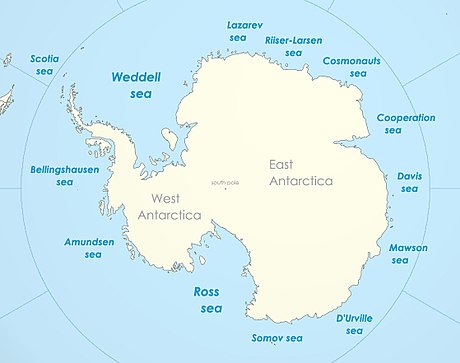Difference between revisions of "Bellingshausen Sea"
Westarctica (talk | contribs) (Created page with "thumb|right|300px|Map showing location of the Bellingshausen Sea The '''Bellingshausen Sea''' is an area along the west side of the Antarctic Penins...") |
Westarctica (talk | contribs) |
||
| Line 7: | Line 7: | ||
The Bellingshausen Sea has an area of 487,000 km2 (188,000 sq mi) and reaches a maximum depth of 4.5 kilometers (2.8 mi). It contains the undersea plain, Bellingshausen Plain, submerged below its waters. | The Bellingshausen Sea has an area of 487,000 km2 (188,000 sq mi) and reaches a maximum depth of 4.5 kilometers (2.8 mi). It contains the undersea plain, Bellingshausen Plain, submerged below its waters. | ||
It takes its name from [[ | It takes its name from [[Fabian Gottlieb von Bellingshausen|Admiral Thaddeus Bellingshausen]], who explored in the region in 1821. | ||
==Ancient History== | ==Ancient History== | ||
In the late Pliocene Epoch, about 2.15 million years ago, the Eltanin asteroid (about 1-4 km in diameter) impacted at the northern edge of the Bellingshausen sea. This is the only known impact in a deep-ocean basin in the entire world. | In the late Pliocene Epoch, about 2.15 million years ago, the Eltanin asteroid (about 1-4 km in diameter) impacted at the northern edge of the Bellingshausen sea. This is the only known impact in a deep-ocean basin in the entire world. | ||
[[Category: | [[Category:Seas]] | ||
[[Category: | [[Category:Geography of Westarctica]] | ||
Revision as of 06:49, 23 March 2018
The Bellingshausen Sea is an area along the west side of the Antarctic Peninsula between 57°18'W and 102°20'W, west of Alexander Island, east of Cape Flying Fish on Thurston Island, and south of Peter I Island.
Forming the southern coasts of the sea are are, from west to east, Eights Coast, Bryan Coast and the western portion of the English Coast of Westarctica. To the west of Cape Flying Fish it joins with the Amundsen Sea.
The Bellingshausen Sea has an area of 487,000 km2 (188,000 sq mi) and reaches a maximum depth of 4.5 kilometers (2.8 mi). It contains the undersea plain, Bellingshausen Plain, submerged below its waters.
It takes its name from Admiral Thaddeus Bellingshausen, who explored in the region in 1821.
Ancient History
In the late Pliocene Epoch, about 2.15 million years ago, the Eltanin asteroid (about 1-4 km in diameter) impacted at the northern edge of the Bellingshausen sea. This is the only known impact in a deep-ocean basin in the entire world.
